The Most Harrowing Work I've Ever Done
My talk on Beyond Trans from The Bigger Picture Conference in Albuquerque
In March 2020, I started running support groups for parents whose children identified as trans. They came in like survivors of a shipwreck—devastated, in shock, and completely alone.
Five years later, this work has become a lifeline. Thousands of parents have found community. Detransitioners who felt utterly isolated have found others who understand. Below are my remarks from Genspect's The Bigger Picture Conference in Albuquerque, where I shared what we’ve witnessed and the data we’ve gathered.
Beyond Trans offers therapist-facilitated support groups for detransitioners and those with gender dysphoria, peer support groups for parents, and a directory of therapists. We’ve run out of funding for one-to-one therapy and can’t pay the therapists who facilitate these groups. If you’re able to help us continue this work, we would be deeply grateful for your support.
I want to talk about the work that I have found probably most interesting and certainly most moving and most harrowing in my life. I’ve been a psychotherapist for, well, nearly 20 years, I’d say, I don’t know how long. And I’ve seen all sorts of different people in different levels of pain that is often indescribable.
And then five years ago, when I met the parents in March 2020, this was just when Covid happened. Jo was so very helpful at the time and another woman called Carol, and they asked me to run parent meetings. I said, yeah, I’d love to, but I’m way too busy. Then Covid happened and I said, yeah, I’ll give it a go, not knowing that my life was changing on that decision.
And we started those meetings in March 2020. We started organising them in March and we’ve had over 10,000 attendances to those meetings. And I’ll never forget those first few months when parents would come in. They were coming in like they were coming out of a shipwreck. They really were. They were coming into the meetings just in shock about what was happening. And their children were highly troubled children, and they were mostly mothers.
So the data—there are some posters outside and you can have a look at them. Mostly mothers, strikingly so. And if you read the poster outside, you’ll see fathers prefer practical problem-solving approaches rather than the emotional support that we offer in Beyond Trans. At the time, we called it the Gender Dysphoria Support Network. We had all sorts of meetings. We had meetings for parents of kids under 15, parents of kids over 15, parents of boys, parents of girls. We had to divide because the meetings were too big. At first I said, I’ll do one a week, then two a week almost immediately, then three a week.
And I’ll never forget that first meeting. And I came down. Henry was downstairs by the fire and I came down and I was shook. And I don’t get shook because I’m used to my work and I’m used to hearing heroin stories and there were tears in my eyes and I was like, I’ve just seen something huge is happening here. I knew it, but I didn’t know it, you know, the way you can kind of know it, but you didn’t.
It was the devastation of the parents who were like, my kids have got wrapped up into something and next week he’s getting his penis removed and he is lost and he is confused and he needs help, proper help and. And the doctor. I remember one image, I’m sure you’ve heard me say it before, but it always stayed with me. She said the doctor, it was like a scene in a movie when it turned out the doctor was the villain and he kind of removed his mask. Cause he said, oh yeah, he does have to get his penis removed. Do you know what I mean? It was like this shocking moment.
And so those meetings, as it says there, from all those different countries all over the world, we tried to do them in different times. They continue. I’ve long ago moved on and I started Genspect as a result of those meetings a year later in June 2021. But they continue and Jo is just an absolute hero, an unsung hero and she organised this entire conference and she organises these meetings. She just does so much work. It’s hard to quantify how much work she does and how well and how gracefully she does it.
But like it says, you can see the different times—that one Wednesday at 5am, that’s for the Australians. Just because we have it in eastern time doesn’t mean everyone attending is in that time zone. But we’ve loads, as you can see, we’ve got parents of desisters because the parents of desisters are traumatised. Their worldview has shook. They say I never again trust the institutions in my life again. I don’t trust people I’ve lost friends and I will never make friends with those people again. They told me that my child should get a mastectomy even though they knew my child was lost and needed help.
There’s parents in crisis. I often facilitate those ones. But usually these meetings are peer to peer. These are just parent-run very much kind of on the model of AA and Al-Anon as in peer to peer. And that’s why they can be free and parents of medicalised children, children who’ve already medicalised because sometimes being with the ones who haven’t medicalised is difficult for both. If you follow me, a parent might come in saying thank God they haven’t medicalised and the next parent mine has. Do you know what I mean? So it’s nice to have a space for parents whose children have medicalised because you go into a different mental space when your child has changed, you know what I mean?
One of the quotes from the poster outside. And I do urge you to have a look at the posters. One of the mothers said, I just look at her eyes. It’s the only thing that hasn’t changed. Her voice has changed, her face has changed, she’s got, you know, facial hair, her body has changed, but her eyes haven’t changed. So I just focus on her eyes. It’s just devastating.
And then there’s parents of estranged children. There’s also bereaved parents because there is a lot of profound trauma and there is suicide. And I know it’s not exalted and it’s not, you know, what’s the word? Higher than other distressed groups, which it isn’t. But it doesn’t mean it doesn’t happen. And when that happens, that can be very, very devastating.
So then a year later, after starting Genspect, I started the Beyond Trans Project. And the idea was we got, we did a Detrans Awareness Day in March and we still run it every year. And we made about $10,000 from that event. And we put that money into therapy for detransitioners. We offered them one-to-one therapy because we knew since we started Genspect how many detransitioners really needed help, needed therapy. And nobody was giving it to them because they had all these captured clinicians who were saying, well, what pronoun are you? And the person would just kind of say, I can’t deal with you.
And so we provided one-to-one therapy. We’ve since run out of funding for that. And so instead we offer free therapist-facilitated. Myself, I do it and Evelyn Ball does it. And we just offer kind of free therapist-facilitated online meetings. And this is the work that I find is probably the most harrowing but also most moving and probably the most helpful work I’ve ever done in my life. I kind of feel this is where I can really make a difference in life.
You know, we also have a directory of therapists and we do advocacy. So if somebody wants to, for example, let’s say a detransitioner will say, I’m working in a school. They’re shoving gender ideology down my throat. They don’t know I’m a detransitioner. What will I do? So we might do some advocacy for that detransitioner to speak to their workplace or whatever so that they could kind of be helped navigate it. Because it’s not easy being a detransitioner. It’s a weird position to be in. In life, when people don’t understand.
So many of, let’s say the women who born female, FtMtF, as they call it, born female, transitioned to male and went back to female. And so many of them, when they try to say that they’re a detrans woman, the person says, oh, you’re a trans woman. Oh, right, yeah. And they completely misunderstand it and it’s very hurtful because they’re like, no, I’m not a male and I haven’t transitioned. I’m a female who looks quite male because of testosterone and I consider myself a victim of medical abuse. But you didn’t hear anything except the word trans. And now you call me a trans woman and the whole staff room has called me a trans woman. So that can be very devastating. So it’s very important. I’m very engaged in this information to kind of get it out.
We’ve had over 600 meetings, over 480 service users of our meetings. We’ve had—the demographics are interesting. So 78% are female, 22% male. And you can see the ages. We’ve had over from 43 different countries. And you’ll see the names there. I mean, we’ve had them from the UAE, from New Zealand, from Canada, US, UK, Ireland, France. We’ve had everywhere. Different time zones as well.
And then if you look at some of the distress, you know, suicidal ideation, 47%. Previous attempt, 15%. Medical complications, 42%. Family estrangement, 24%. Most, about 72% are living as their birth sex and 23% identify as non-binary and 5% continue to identify as trans but want support. So that’s really important because we don’t have a political agenda in these meetings. We just want to help people. Some people stay in transition. Some people live as non-binary.
And then 31% have had chest surgery, 5% genital surgery, 77% have had hormones. And 83%, as you can see, experienced regret and doubt. That’s the one I want to concentrate on. And I would say if you look at the really severe doubt and regret, it’s probably more about 51%, because when people come in first, they’re so vulnerable and they’re so damaged and they’re so fragile. They might say, oh no, I’m not sure. And then you kind of get to know them over a few months and you’re like, no, no, you’re really struggling. This is really bad. And they do admit to it eventually.
And often I get a sense that it takes ages to really land. Like for example, it could take five years in many cases, if not longer. Some people say, and I do often say five to seven years. It looks a bit longer than that to me. I think I’m aware that that’s not good news, but it seems to me to be a little bit longer than that. It depends. It looks like females, and I know Lisa Littman did some research on this. Looks like females detransition faster than males. Arguably, there’s all sorts of reasons for that.
So there’s some details. Age to begin transition is from 13 to 68. Do you see that slide? The average time spent in transition is nine years, but with a range of one to 36 years. So some of them stayed for decades in transition. And they say to me, you know, within two years, I regretted it and I prevaricated because I thought I’d gone too far. Because I had gone too far and I didn’t know how to get back.
Loads of them, just so, you know, say I detransitioned for a year or two. It was too hard. It was just too hard. I was too lonely. I was just made an ostracised part of society. I just went back into transition because it was easier. Now with hopefully these communities that we’re creating now, I would hope that they would stumble into these meetings. And they do stumble in, because you can see them looking around going, this is wild. Do you know what I mean? That they’ll start to think, no, there is a community, there is a way forward.
Because these are people who transitioned in their 80s and 90s, the 1980s and 1990s, they had nobody. They were on their own, silently. So many of them silently stopped transitioning. And then a couple of years later just went back in, you know what I mean? Very like. I would say very like alcoholism or drug addiction. It’s just too hard. Real life is too hard. I’m going back in.
And then if you look at it, the age to detransition, the average age is about 27. The average age is 34. The median is 27. And anything from 18 to 85 years since. Some of them arrive literally weeks into their detransition. Some detransitioned 34 years ago, and they come into their meetings going, I’ve never met any other detransitioners.
As you could imagine, I could talk about this forever. Fascinating data. So if you look at the different ages here. In the blue graph, 13 to 15, that’s a small number who transitioned at that age. Then a high number transition between 16 and 20, another high number between 20 to 25. But then there’s the older transitioners. Do you see from 26 to 30, 31 to 40, 41 to 50, 51 to 68. These are people who recently who kind of got in on the trans phenomenon, especially in recent years, and thought, yeah. And some of them come to our meeting saying, I think I might transition, and I’m 40, you know what I mean?
And then the age to detransition. There’s a detransitioner who detransitioned at 17 in our meetings. She’s over 18 now. But it’s extraordinary to go through—you’ve gone through medical transition and detransition. It’s an extraordinary concept. And you see the ages of detransition, they go quite late. You know, there’s loads between 21 and 25 and loads between 26 and 30. But then later on, there’s a consistent people who are in their 50s, people who are in their 60s, and they all have phrases.
We really need to work on the phrases. Transition isn’t a correct word. Detransitioned isn’t a correct word. You know what I mean? They’re not transitioning and they’re not detransitioning. Some of them say I lived in the trans delusion or I lived in transition. I no longer live in transition. I got off the crazy train, got lots of phrases.
Here’s a few phrases from the detransitioners. My life was on hold when I was living in transition. My parents are angry with me. I avoid them, I cause them hell. My body wants to have been left alone. My body is kicking off with all of this medicalisation. It’s taboo to be negative about trans. But it ruined my life. When I was starting to detransition, I experimented with femininity in secret. And my trans identity. So many have said this. My trans identity protected me. I’m afraid to live without my shield.
And this is kind of interesting to see how long people stayed in transition. Eleven of the people who disclosed they spent one to five years in transition, then the majority spent six to 10 years in transition, and then a small number spent huge levels of years in transition.
And then some of them, like I say, detransitioned many years ago. And I love when they come in because they can often give real hope to the people who detransitioned last week. They’re like, you know what? This used to be the big thing in my life. And it’s like a boat that went out into the ocean. It’s just not that big a feature anymore.
But a lot of them now have medical complications. And I know there’s some organisations—Resilience Health Network—there are organisations that are trying to give help with physical complications. Detransitioners sorely need it. They have a lot of complications, and the doctors don’t know what to say to them. The doctors can’t give them help.
I remember one person who was medically transitioned as a child, was given a mastectomy when they didn’t have breasts—it was to stop the idea that there would be any future growth because they had been puberty blocked. And then let’s say you’re in your 20s and you realise it’s all been a mistake. And as a lot of them said, I don’t know what it is to push oestrogen into my body because I never had oestrogen because I was puberty blocked and I’ve had testosterone for 20 years and I’m a walking experiment and I’m in chronic pain and I’m not convinced that I should put oestrogen into my body that doesn’t have ovaries. So we’re in extraordinary territory with those sort of concepts.
And so, like just the last few quotes here, people assume I’m an egg and I’m going to transition. The doctor explained being trans as a neurological condition. My consent form has drawings of rainbows on it. I was a baby, really. They rolled out the red carpet for me. When I transitioned, I outsourced my autonomy and authority to my therapist. The therapists come out really badly in these meetings. It was sold to me as a way to disappear into society.
I didn’t feel I had that. This is somebody who didn’t detransition. Quite a few of the older ones don’t detransition until they retire. And one of them said, I didn’t feel I had the right or wherewithal to expose my patients to my chaos by detransitioning. I didn’t feel I could impose that upon people.
And so I’m nearly at the end now. The geographical location is mostly in North America, some in Europe and some in other countries. There’s the different countries and like I say, it’s all in the poster. I’m not going to take questions because I ran over, but I’m talking to everybody so you can come up and ask me any questions you want.
Let me see. Please help us. Please please consider funding this. We would love to pay the therapists. We would really love to pay therapists and roll out many of these meetings and we don’t have any funding for this particular thing at all. We did have it and we gave it to, you know, we gave it to the one-to-one therapy and now we don’t. But we think it’s the most valuable service. We run loads of things in Genspect. This is the one that I think is really, really, really helping people in a very practical way.
Thank you.



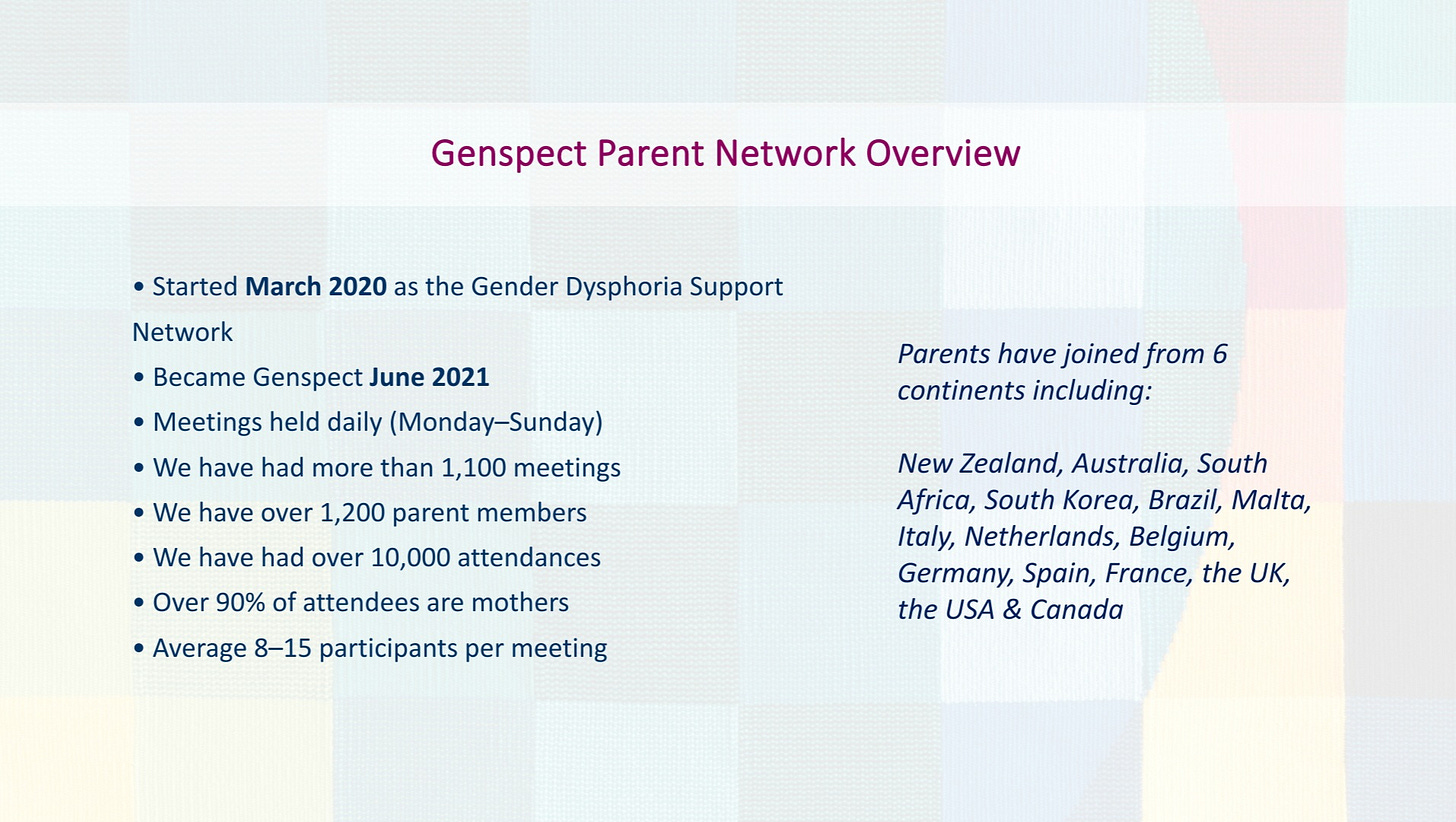
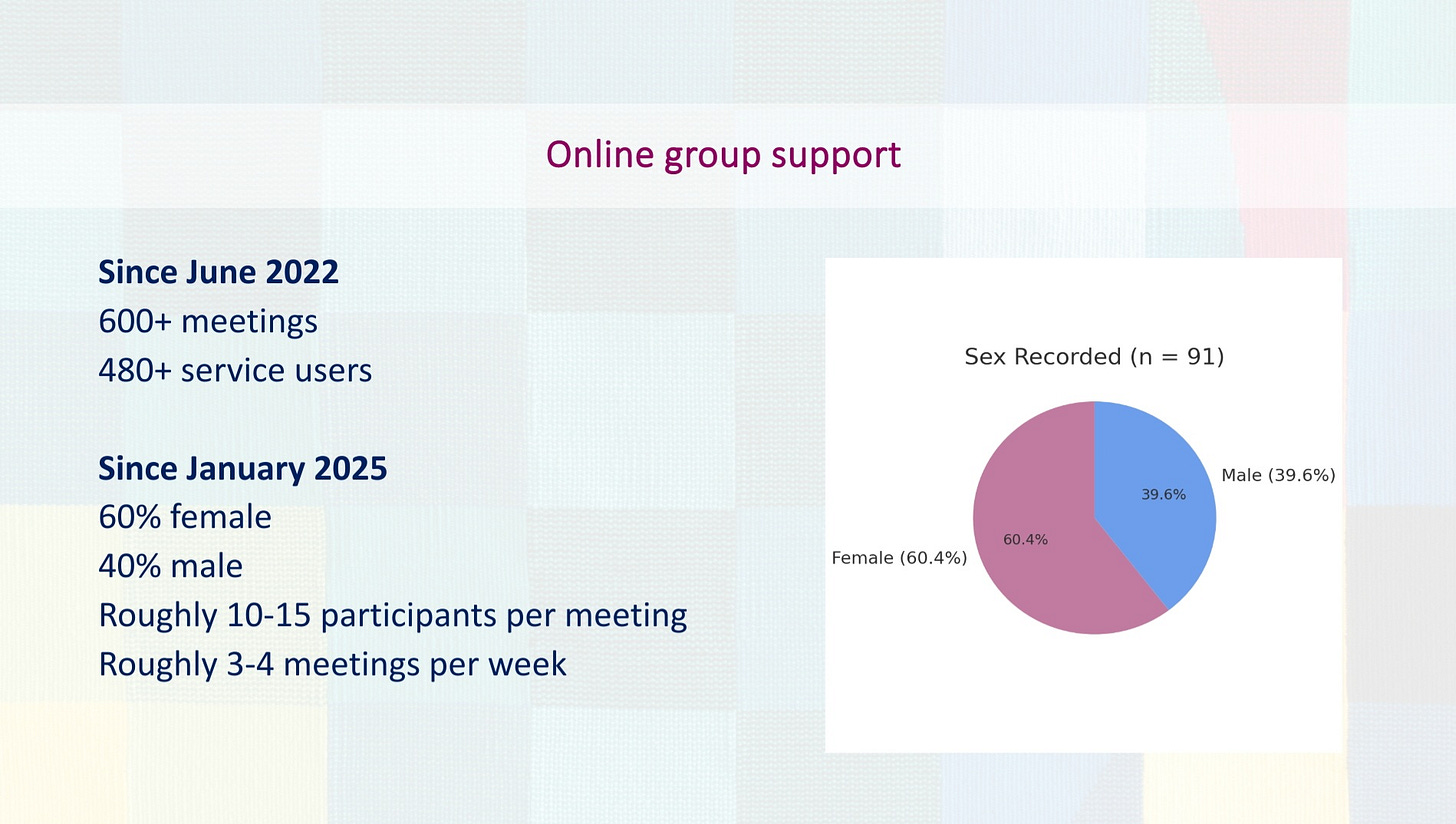
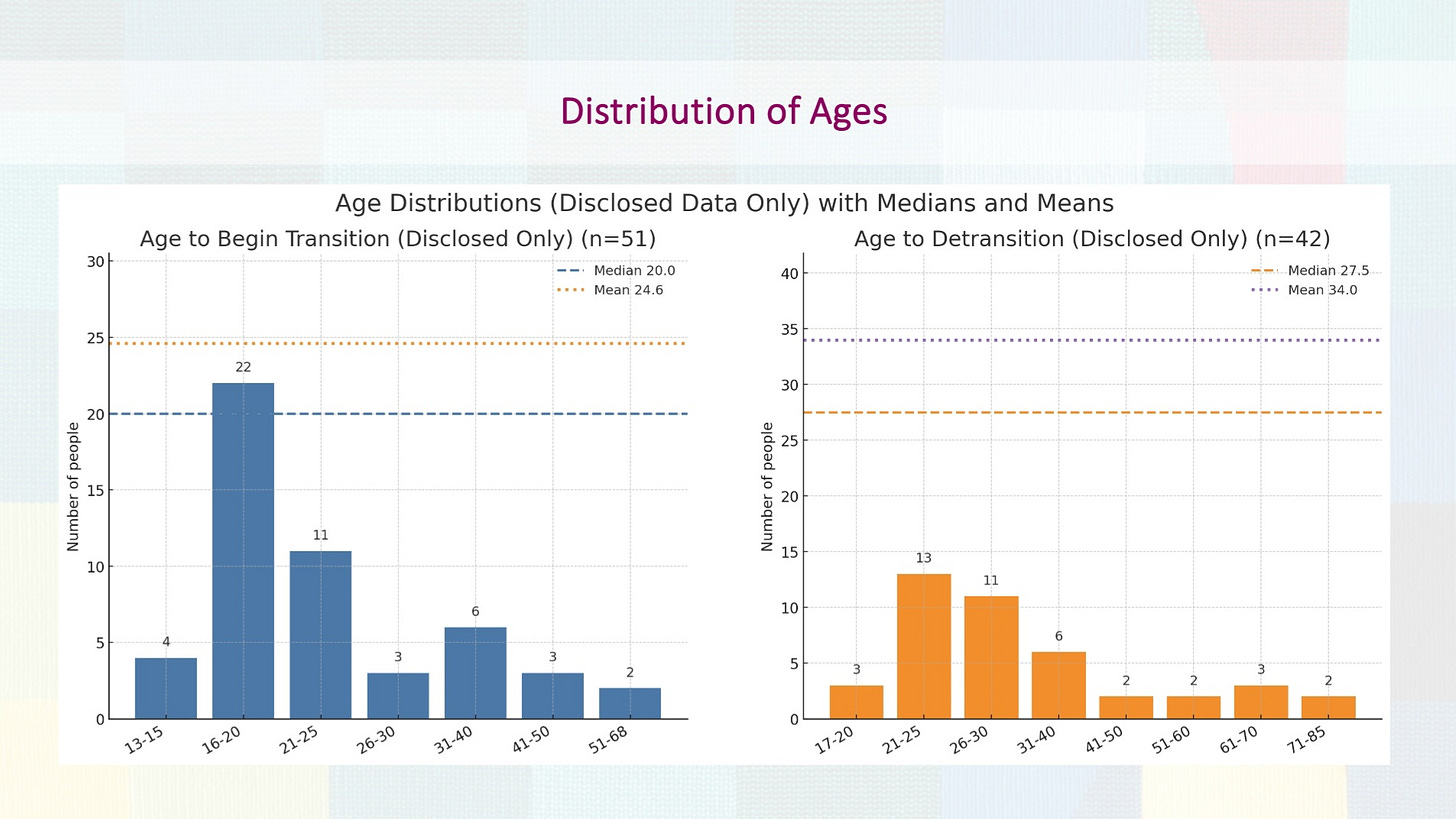
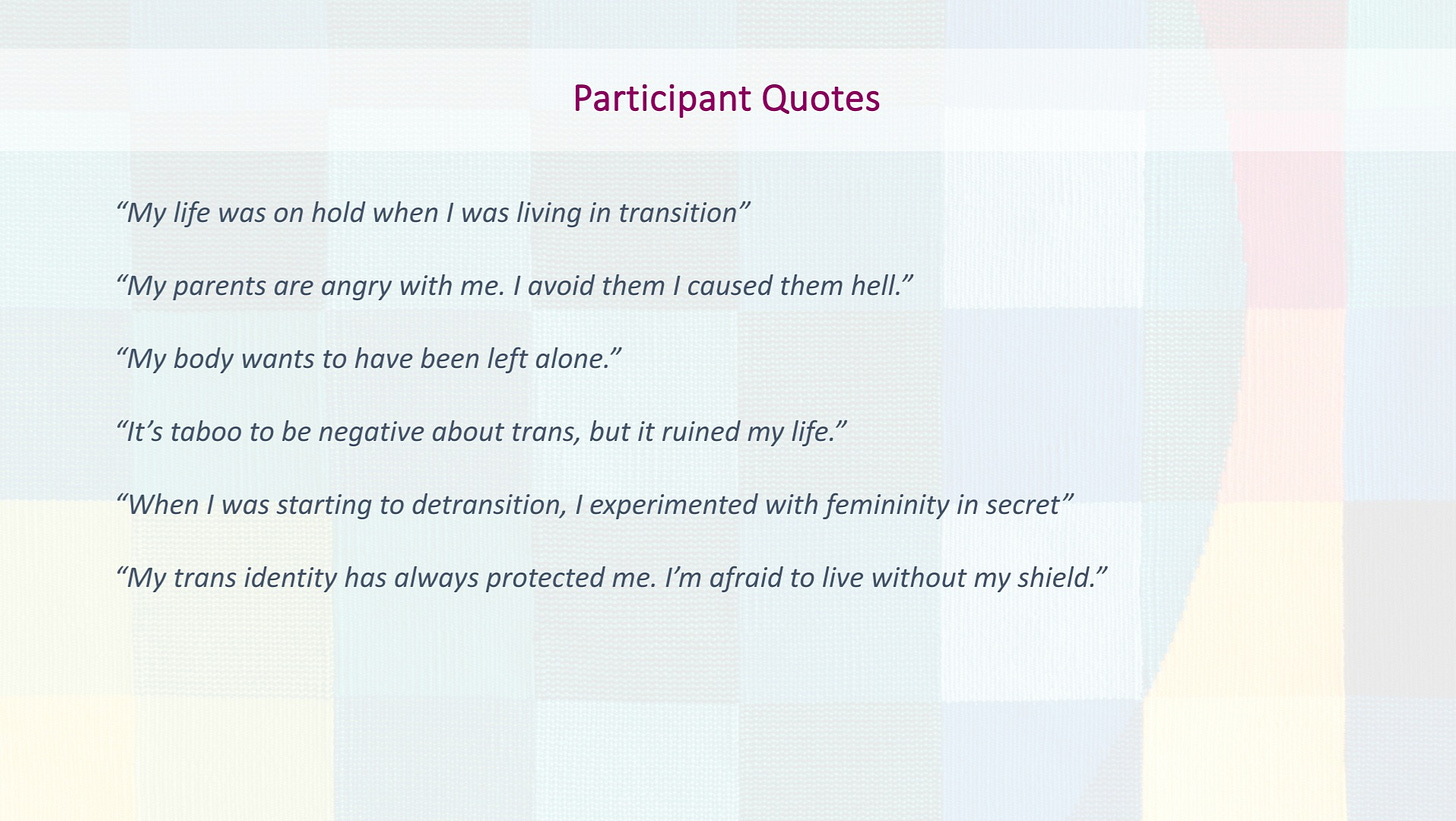
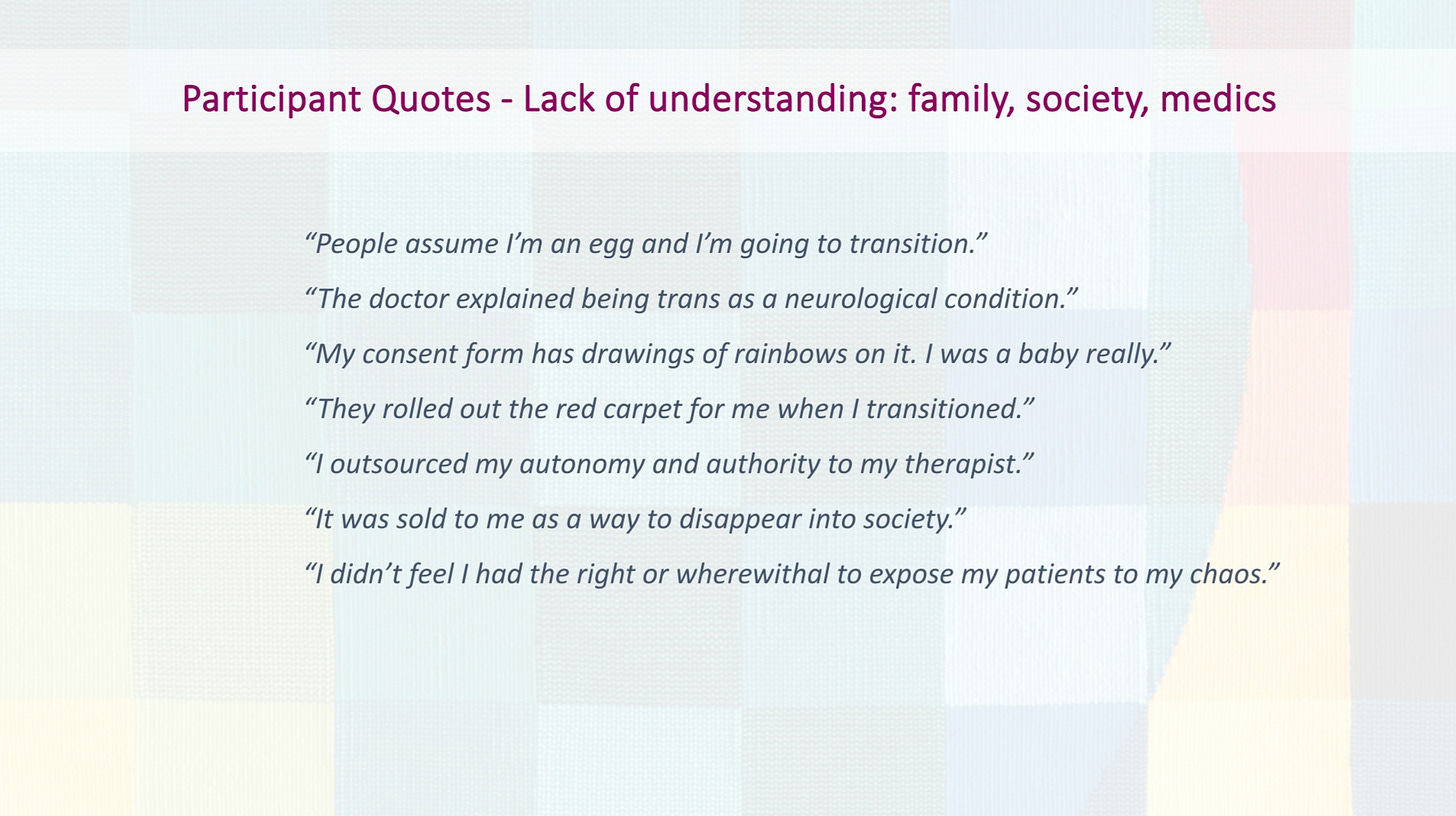
Stella,
How can I contribute to the funding? Please let us know the details. Thanks.
Thank you for this perspective and your dedication to the work you do! It is much appreciated.